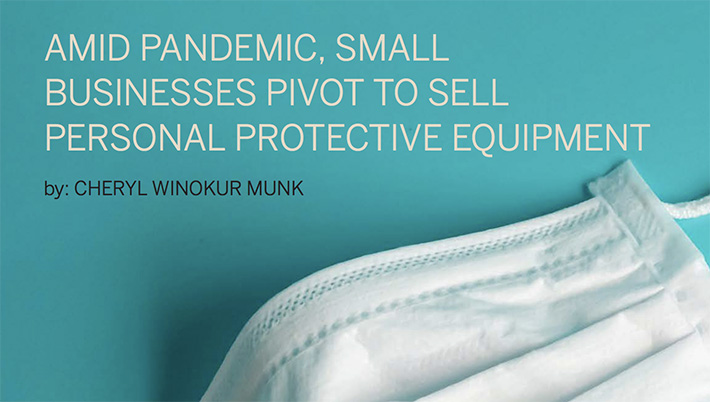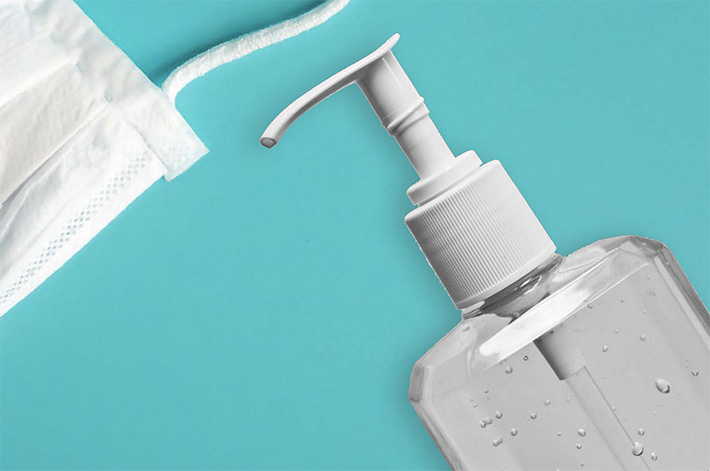Amid Pandemic, Small Businesses Pivot to Sell Personal Protective Equipment
 A number of small businesses—including those in the merchant cash advance industry—faced with little or no way to make money for months—have pivoted to selling personal protective equipment.
A number of small businesses—including those in the merchant cash advance industry—faced with little or no way to make money for months—have pivoted to selling personal protective equipment.
It’s no wonder businesses across the U.S. have shifted gears. With the pandemic raging, and consumers and businesses trying to return to some sort of normalcy, there’s high demand for these products, causing even businesses that previously had no connection to them to spring into action.
“It’s not my forte; I had to pivot just to make sure I could stay afloat before things turned around,” says John DiCanio, founding partner of Direct Merchant Funding in Bethpage, N.Y.
This past spring, at a time when everything in the MCA business stopped, he heard from a merchant in the medical supply field that masks were becoming very important. The merchant connected him to a contact in Hong Kong from whom he was able to buy hospital-grade and non-medical grade masks and sell them to local hospitals, local businesses and others.
DiCanio says he did it for a short time only—two months—which was enough to tide him over under his
regular business started coming back. Mask-making is still a big business and a lot of people are still doing it, but he prefers to stick to merchant cash advance, which he’s been doing for around 15 years. He says business has picked up enough that he no longer has the need to do anything on the side—and he hopes it stays that way.
Many funding industry participants are still selling these types of products, but it’s somewhat of a hush-hush business. Not everyone wants to talk about it for any number of reasons, including embarrassment and fear of looking weak to customers and business connections. Even so, small businesses that pivoted say they are doing the best they can to stay afloat—and there’s no shame in that.
Kat Rosati, founder of Apparel Booster in Riverside, Calif., a product development agency for luxury and socially conscious brands, began hand-sewing masks to help support her business that had been hit-hard by the pandemic.
She has manufacturing partners all over the world, and production was at a standstill for her various products. She couldn’t import fabric needed for the company’s various projects and a lot of production partners were forced to close. Luckily, she had a connection to a fabric mill in Pennsylvania that focuses on antimicrobial products that was willing to provide her with material.
She hired temporary workers to help her make masks, which she’s producing at a rate of about 150 a week. She sells them to consumers and small businesses. The revenue has helped defray overhead expenses, among other things. “It hasn’t been super profitable, but it’s definitely helped keep the business alive,” she says.
She had to furlough her four-person team because she can’t afford to pay them without regular client work coming in. Her husband, who works in the restaurant industry, was also furloughed. So whatever money she can bring in, helps. “I’m watching small business owners around me that haven’t made any kind of pivot close left and right,” she says. “The fact that I can keep mine alive makes it worth it for me.”
To be sure, small businesses pivot for all sorts of reasons, and it’s not always because they are struggling. Francis Perdue, a publicist and business consultant in Birmingham, Ala., began selling PPE products including gloves, kn95 masks, surgical masks, customizable cloth masks, child and adult-sized shields, suits, gowns and the Xenon Fever Defense machine which uses AI technology to measure skin temperature and detect potential fever. She says she saw a need for these types of products in local schools as well as in hospitals and clinics in predominantly black neighborhoods. She is still consulting, but doing this as a side gig while the need persists.
Another example is MORGAN Li, a retail and hospitality manufacturer in Chicago Heights, Ill. The company identified the need and opportunity to help businesses remain open or reopen to customers while abiding by new recommendations to support public health. Thus, the company began producing customized social distancing materials including sneeze guards, safety shields, signage and floor graphics for various businesses to remind employees and customers to comply with social distancing requirements, according to a spokeswoman.

More recently, Andy Rosenband, the company’s chief executive, saw another opportunity to help communities prepare for another critical stage—reopening schools. He created a line of personal protective equipment that specifically addresses the challenge of social distancing in schools to keep students, teachers and staff safe.
For some small businesses, the shift is likely to be a permanent one.
JB Herrera, founder of Perceptive Insights a San Diego-based small and medium business consulting and mentoring company, says his firm was growing, but PPE products offer the ability to create a broader impact and are likely to be more profitable than merely a consulting business.
He has clients in China and back in December when things were starting to get bad there, he realized that the problem could spread massively to the U.S., and if it did, 80 percent or more of businesses would be negatively impacted, in his estimation. Using his business expertise regarding supply chains and pre-existing and new contacts, his company shifted gears to introduce in March a line of FDA-registered products designed to create and maintain safe environments. The products include commercial and personal cleaning solutions, masks, light technology disinfectants, air filtration, and personal sanitizing kits.
Even before the pandemic, the PPE market was worth several billion, he says, and that’s likely to grow exponentially over the next five to 10 years. So much so, that he expects the new business line to represent 90 percent of his revenue for the next three years—at least.
“Even after the spike goes away, it’s still going to be a profitable business in its own right,” he says.
Last modified: September 23, 2020






























